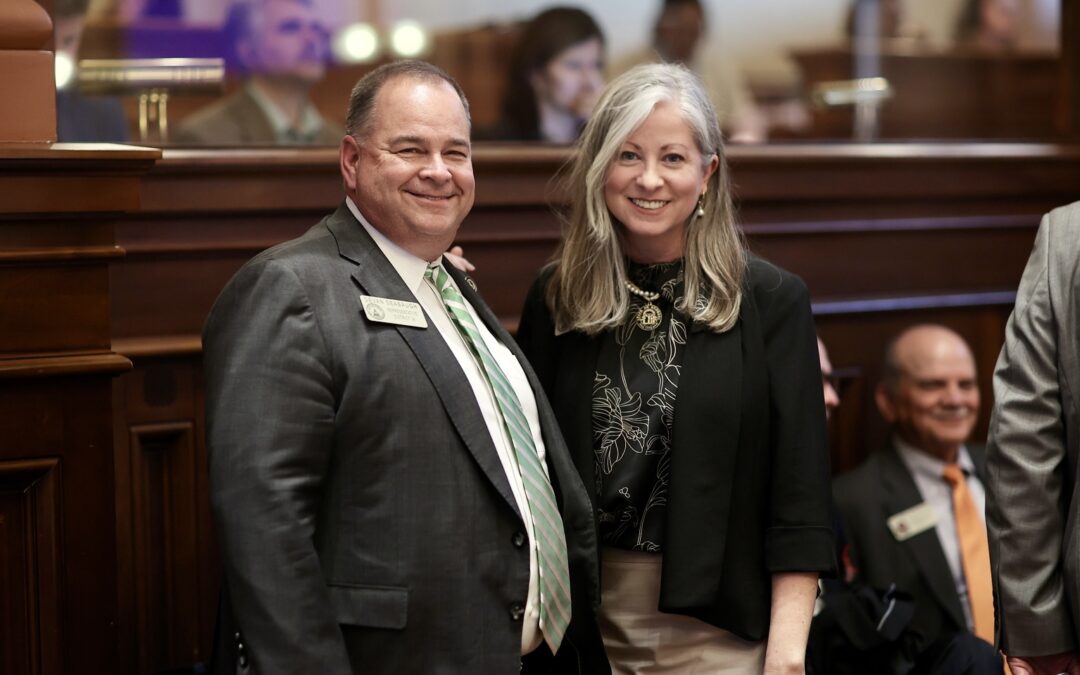Sine Die! Last week, the Georgia General Assembly completed the final two days of the 2023 legislative session. It ended Wednesday, March 29, when the House and Senate adjourned around midnight to complete Legislative Day 40. During these two long days, we worked late into the night to vote on legislation that will impact communities across our state. All the bills that received final passage before we adjourned will go to Governor Kemp for his final consideration. I will highlight a few of the bills that received final passage below.
Fiscal Year 2024 Budget
House Bill 19, the Fiscal Year 2024 budget passed, fulfilling our only constitutional obligation of the session. A revenue estimate of $32.4 billion is set for this final version of the budget. More than 50 percent of this state budget is dedicated to funding our state’s K-12 and higher education systems and includes $13.1 billion to fully fund the Quality Basic Education program. This budget includes a $2,000 increase to the state base salary for certified teachers and school employees.
To ensure the House’s public safety priorities are reflected, this budget includes $23.5 million for a total compensation increase of $4,000 for more than 3,900 law enforcement officers across 12 state agencies; front-line state officers would receive an additional $2,000 salary adjustment in certain departments.
Finally, almost 10 percent of the FY 2024 budget would go toward economic development and general government services, and seven percent of the budget would support transportation infrastructure improvements. You can find more highlights from the FY 2024 budget here. The governor has received HB 19 for his consideration.
Addressing Homelessness
Homelessness is a serious issue around the state, including the 156th district. Drug use and criminal activity increase where homeless encampments exist, and Senate Bill 62 addresses this crisis. This bill prohibits local governments from refusing to enforce policies that deal with unauthorized public camping or the obstruction of sidewalks. It also prohibits hospitals and local government entities from dropping off homeless individuals outside their area of operation or jurisdiction. Furthermore, the state auditor is required to conduct a performance audit of homeless program spending in the state to ensure taxpayer money is being properly spent to address the homelessness issue. This bill received final passage on sine die in the House and moves on to Governor Kemp’s desk for his signature.
Soap Box Derby Bill
This session Lyons and the Southeast Georgia Soap Box Derby received a lot of positive support from around the State. When I introduced this bill, I never imagined it would become the focus of attention that it did in the closing weeks of the legislative session. When the Senate sought to use this simple bill as a mechanism to pass sports gambling in Georgia, I respectfully asked that the soap box derby language be removed so this wholesome program would not be associated with gambling. As a result, I received an overwhelming outpouring of support from around Georgia for standing up for our values, for the soapbox derby, and for Lyons.
With the full support of the House, I remained hopeful until the end of session that we would find a way to get this legislation passed. Unfortunately, it did not make it to a final vote in the Senate before sine die. Ultimately, these challenges have resulted in significantly increased interest in the derby and Lyons. I have heard from organizers that people from around the State are contacting them and seeking to get involved. There are several legislators that have expressed interest in attending this year, including Representative Al Williams (D-Midway) who I will be racing at the derby in April!
As for the legislation to make our soapbox derby the official derby of Georgia, I plan to keep fighting next session to make this happen.
2023 House Study Committees
Each session, the House establishes study committees that work throughout the summer and fall to examine specific policy issues that are important to Georgians. Before the session ended, the House adopted measures to create study committees that will keep us busy until the 2024 legislative session begins next January.
- House Resolution 488 reauthorizes the House Rural Development Council (HRDC) for the next two years. Created by the late Speaker Ralston in 2017, the HRDC will continue to work with rural communities to encourage economic growth and job creation and develop effective legislative solutions targeted toward supporting these communities. I am honored to have been appointed to the HRDC by Speaker Jon Burns.
- House Resolution 603 creates the House Study Committee on Certificate of Need (CON) Modernization, which will address how our 40-year-old CON laws can be improved to meet today’s health care needs.
- House Resolution 519 creates the House Study Committee on Fishing Access to Freshwater Resources. This group will examine recent issues that have hindered public access to our rivers and other waterways.
Other Bills Given Final Passage Include
The following bills received final passage in the House before sine die last week and have been sent to Governor Kemp for his signature.
- House Bill 188 implements several changes related to sexual offenses. This bill adds definitions of certain sexual felonies and adds punishments for such crimes. It imposes harsher penalties for repeat offenders. Electronic monitoring is required as a condition of probation for such predators;
- House Bill 189 increases the truck weight limit from 84,000 pounds to 88,000 pounds on Georgia roads for trucks hauling agricultural or farm products within a certain radius of the farm or point of origin; notably, for the past 3 years, the truck weight limit has been 95,000 pounds per Governor Kemp’s executive order;
- House Bill 414 would create the Veterans Mental Health Services Program, a grant program that would fund behavioral health services to service members, veterans or family members through non-profit community behavioral health programs;
- House Bill 538, or the Georgia Early Literacy Act, requires public schools systems to teach using high-quality literacy instructional materials approved by the State Board of Education in kindergarten through third grade based on the science of reading. The Georgia Department of Education must develop and provide training to teachers licensed or commissioned by the state to teach literacy instruction by July 2025. Students across the state will take a universal reading screener assessment to monitor their progress in foundational literacy skills multiple times a year.
- Senate Bill 11, or the “Georgia Fights Terrorism Act,” grants original jurisdiction to the Georgia Bureau of Investigation for violation of laws concerning domestic, cyber, biological, chemical, and nuclear terrorism;
- Senate Bill 68, adds offenses and allows for the prosecution of dogfighting under the racketeering influenced and corrupt organizations, or “RICO,” framework;
- Senate Bill 92, creates the Prosecuting Attorneys Oversight Commission (PAOC) to examine any district attorney (DA) or solicitor general (SG) who demonstrates mental or physical incapacity, willful misconduct in office, willful and persistent failure to carry out duties, conviction of a crime involving moral turpitude, or conduct prejudicial to the administration of justice; this panel will also investigate any DA or SG who knowingly authorizes or permits an assistant DA or assistant SG to commit any act constituting a ground for removal; the PAOC can entertain a complaint on various grounds, including when a DA or SG has a stated policy that demonstrates categorical refusal to prosecute any type of offense, such as refusing to enforce Georgia’s Heartbeat bill; while we do not face this issue in our part of the state, there are DAs in some larger cities who need oversight;
- Senate Bill 121 prohibits municipalities from denying the installation of a well to provide water for a single-family residence located on private property of one acre or larger;
- With the goal of avoiding the unnecessary placement of children in foster care, Senate Bill 133 clarifies several of Georgia’s code sections to improve juvenile court proceedings for children in need of services or for child delinquency or dependency proceedings. Prior to placing a child in DFCS custody, the court must first consider what services have already been provided to the child or the parent/guardian and what services may be available to allow the child to remain in his or her home. In recent years, the state has struggled to find housing and foster families for children with complex needs, which has resulted in these children staying in hotels and other temporary spaces. Under this law, DFCS and our court systems should do a better job ensuring that children receive appropriate care, have placement options identified in a timely manner and, hopefully, provide services that could avoid placing them into foster care altogether;
- Senate Bill 155 creates the offense of aggravated harming of a public safety animal when the offender knowingly and intentionally kills or injures the animal in a manner that affects its ability to perform its duties; the penalty for this conviction would be between two and 10 years of imprisonment and/or a fine up to $50,000;
- Senate Bill 159 enhances penalties for a person who brings contraband beyond a prison guard line for the purpose of providing these items to inmates; this includes Department of Corrections employees or contractors; this violation would be punishable by a 10-year term of imprisonment;
- Senate Bill 217 restricts when a school zone speed limit may be enforced using an automated traffic safety device to 30 minutes prior to and 30 minutes after school starts, 30 minutes prior to and 30 minutes after school dismisses unless the school campus is bisected by a highway or when the driver is 10 MPH over the speed limit;
Special Colleagues I’d like to Share with you
I have thoroughly enjoyed building relationships with others working at the Capitol during the legislative session, but there are a few I’d like to specifically share.
Annual 2021 Class Photo
Representative Devan Seabaugh and I were elected to fulfill the vacated terms of our predecessors in special election runoffs in 2021. We’ve become fast friends and have enjoyed serving on the Majority Whip team together. Here’s to many more years of service for the BEST CLASS EVER!
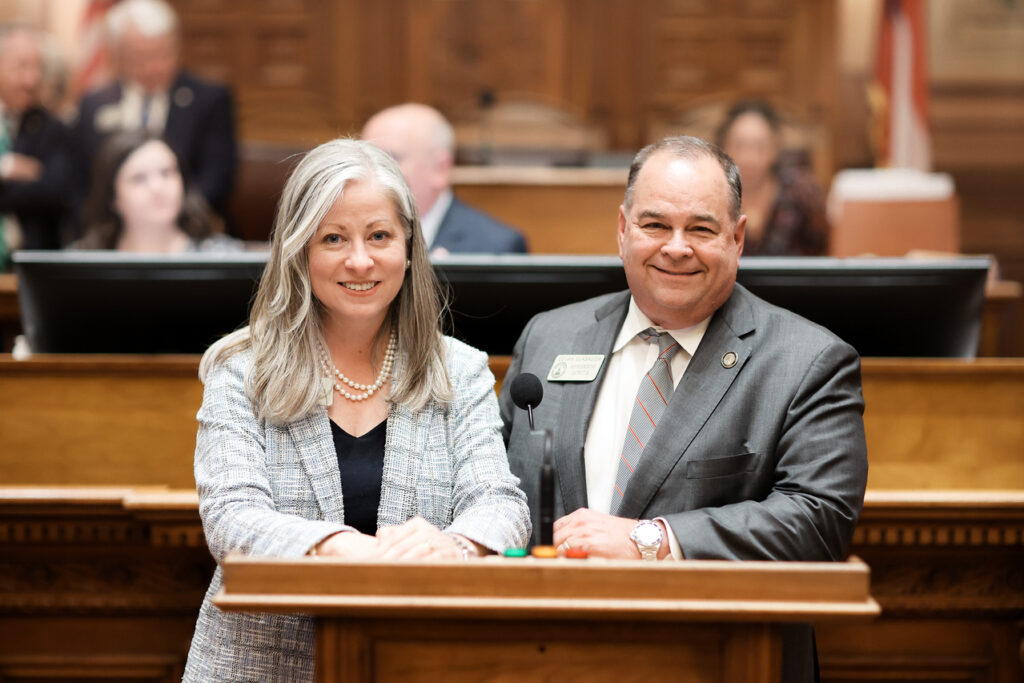
Penthouse 612 Suitemates
This term, I share an office suite in the Coverdell Legislative Office Building across the street from the Capitol with seven other legislators. We affectionately call it the Penthouse. Along with our administrative assistant, Chelsea Bell, this team has accomplished much this session. The ladies are (L-R) Rep. Bethany Ballard (R-Warner Robins), Rep. Kimberly New (R-Villa Rica) and Rep. Leesa Hagan (R-Lyons). The gentlemen are (L-R) Rep. Johnny Chastain (R-Ellijay), Rep. David Huddleston (R-Roopville), Rep. Victor Anderson (R-Cornelia), Rep. Clint Crowe (R-Jackson), and Rep. Mitchell Horner (R-Ringgold).
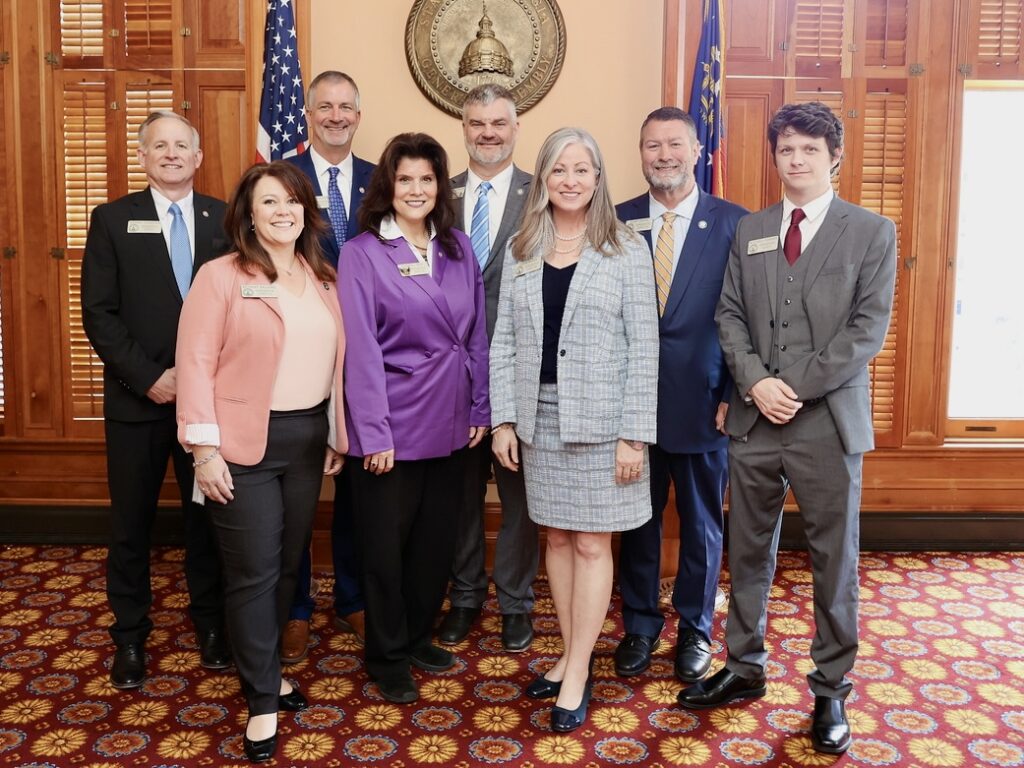
Chamber Seatmates
We spent many hours at our desks in the House chamber between January 9 and March 29. I’m fortunate to have spent those hours sitting between Rep. Matt Reeves (R-Duluth) and Rep. Katie Dempsey (R-Rome).
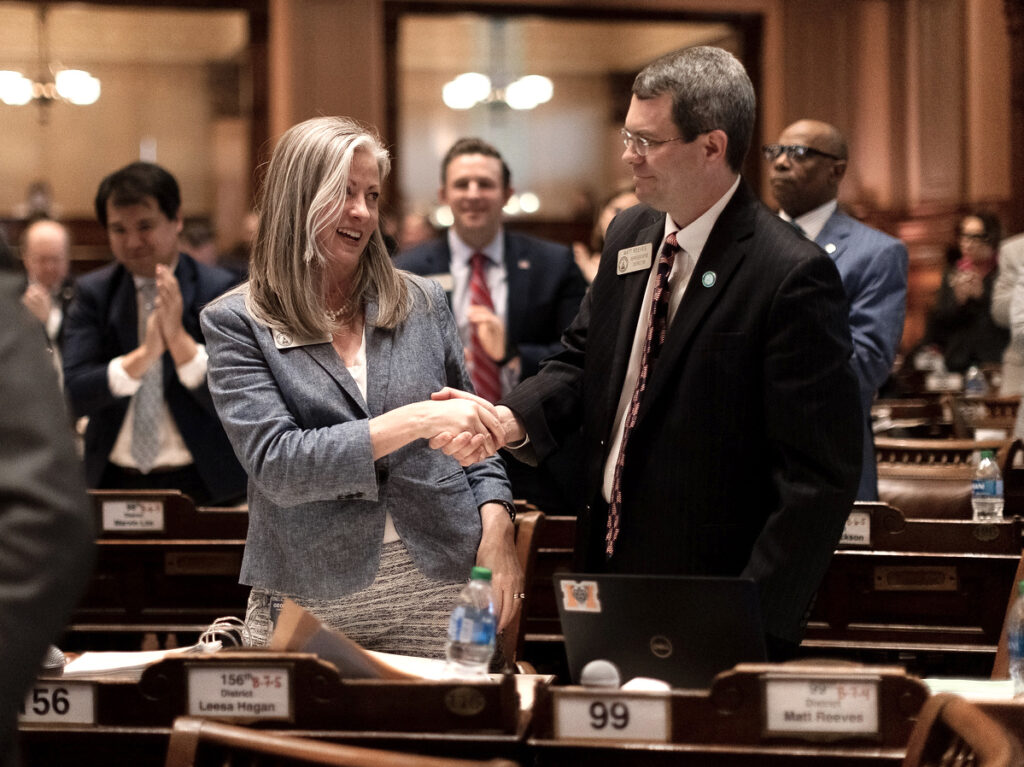
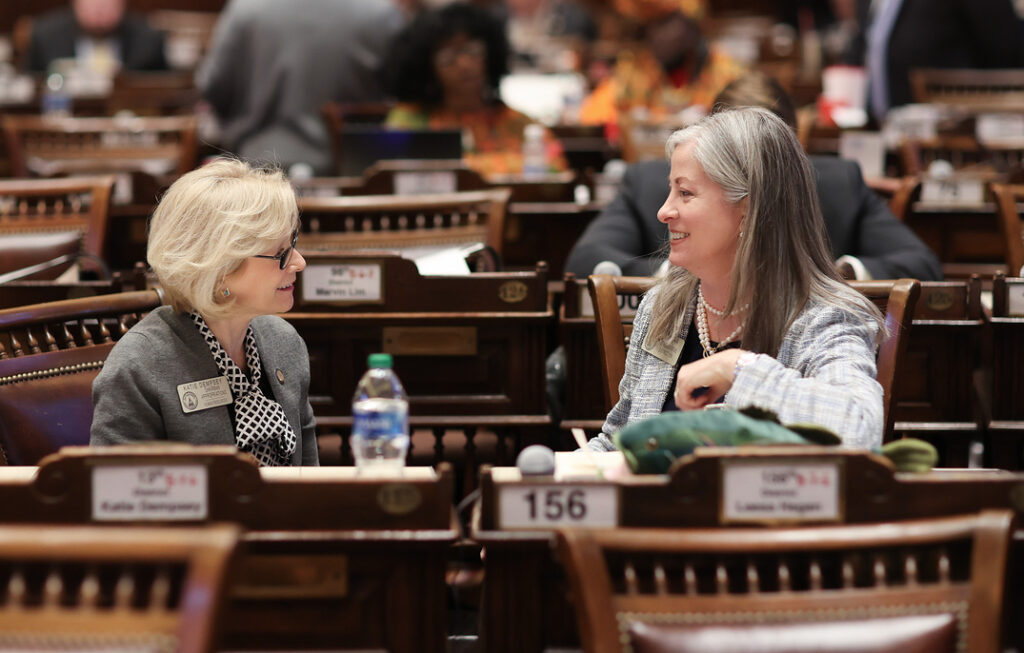
My Roommate
Spending three months of the year away from family and friends back home can be difficult. Having a wonderful roommate makes it much easier. This is my roommate, Beth Camp (R-Concord). She’s a strong leader and a steadfast friend.
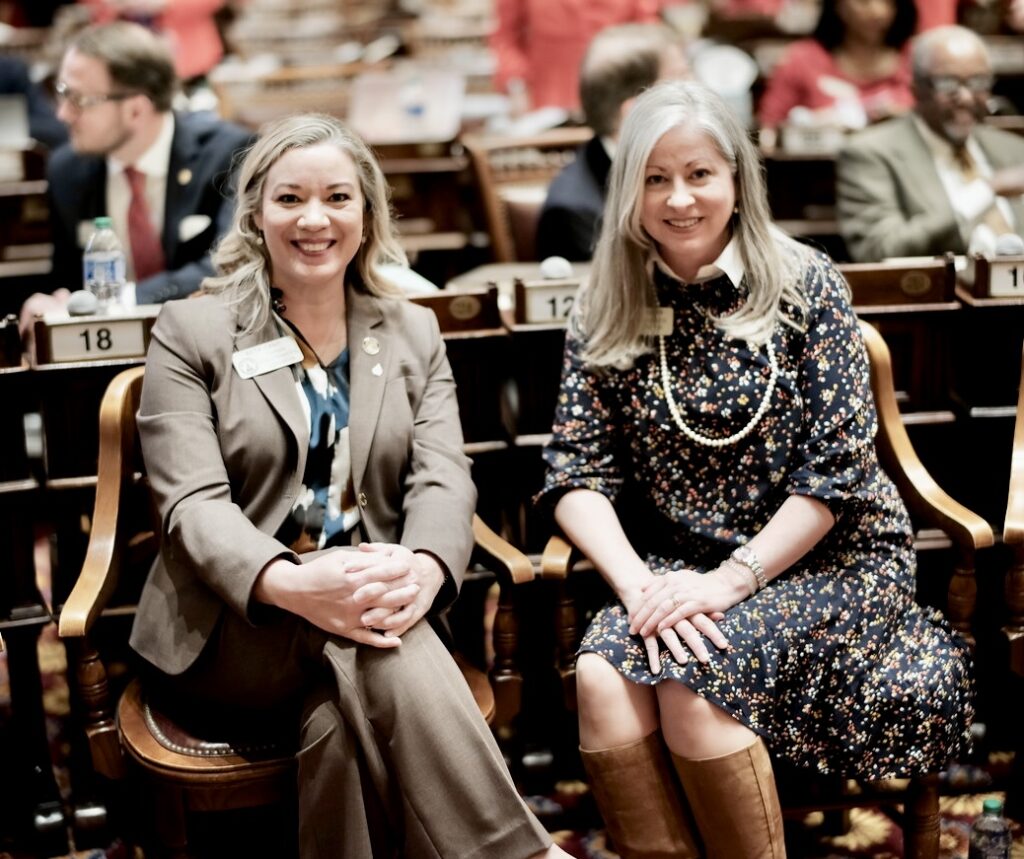
Over the next 40 days, Governor Kemp will either sign or veto measures that received final passage by the House and Senate. Any bill the governor does not veto within this 40-day period will become law. House bills that did not receive final passage this session have been sent back to their respective committees and are eligible for consideration again next year.
I hope you will contact me if you have any questions regarding potential new state laws or if you have any suggestions for future legislation. Please feel free to contact me any time by email at Leesa.Hagan@house.ga.gov. Also, if you haven’t signed up to receive my newsletter, please do so here. Also, my constituent services page has several resources you may find helpful.
Now that session is over, updates will not be weekly, but when there is important information regarding your state government I’ll pass it along to you.
It is an honor to be your representative in the General Assembly, and I thank you for trusting me to serve you.
Kind regards,

